BBC Africa Eye
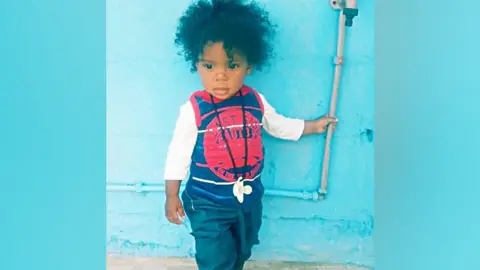 Africa family
Africa familyThe distraught father lies on the narrow, single bed and points to two small bullet holes in the wall of his house.
This is stark evidence of a moment that shattered his family’s life forever.
Devon Africa’s four-year-old son Davin was shot dead in February, caught in the crossfire of a shoot-out between criminals.
He was a victim of the gang warfare that has plagued the Cape Flats, the townships around Cape Town – a legacy of apartheid, when the non-white population was forcibly moved from the centre of the wealthy city to the under-resourced outskirts.
“This is the bullet hole here,” he says. “This is where he slept.”
The family had already endured unspeakable horror.
Davin’s older sister, Kelly Amber, was killed two years earlier, also shot as rivals fired at each other. She was 12.
Now Devon and his wife, Undean, have only their youngest daughter left.
“She asks me: ‘Where’s my brother?'” says Undean. “So I told her he’s with Jesus in daddy’s heart and in my heart.”
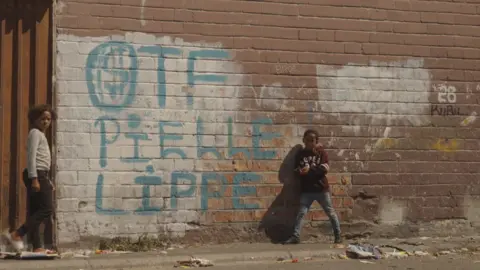
These murders took place in an area known as Wesbank, but many other families across the wider Cape Flats area have had to endure similar nightmares, despite assurances by the police of increased patrols.
The numbers tell a horrifying story. The Western Cape province – in which the Cape Flats sit – consistently sees the overwhelming majority of gang-related murders in South Africa, according to the police.
Officially, this is a policing priority for the government. President Cyril Ramaphosa set up a special unit to combat gang violence in 2018, he also briefly deployed the army to the area the following year, but the problem has persisted, and the killings have continued.
“There’s a whole history and generations of people who have been born into these gangs,” says Gareth Newham, head of the Justice and Violence Prevention programme at the Institute for Security Studies in Johannesburg.
“[They] flourish in areas that have largely been neglected or underdeveloped by the state. The gangs provide a form of social structure that actually provides services to the communities that the state doesn’t. They provide food for homes. Money for electricity. Money for transport or funerals. These gangs even pay school fees.”
They are embedded in the community and “that’s why it’s so difficult for the police to tackle them… it means that they can use non-gang members’ houses to store drugs and store weapons”.
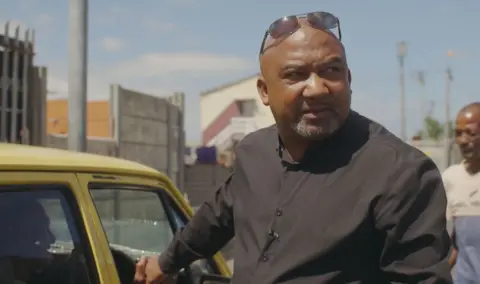
But there are people trying to tackle the issue.
Fifteen kilometres (nine miles) away from Wesbank is Hanover Park where Pastor Craven Engel is glued to his mobile phone almost all day, every day in his quest for peace.
His mission is to mediate in gang conflicts to stop this violence and the killings, fuelled by the lucrative trade in drugs. He and his team try to follow a basic formula: detection, interruption and changing mindsets.
“Hanover Park doesn’t really have an economy to speak of,” says Pastor Engel. “The bulk of the economy comes out of the drug culture. That’s the biggest economy.”
Pastor Engel says that apartheid’s impact on the area can’t be overlooked but neither can generational trauma – manifested as drug addiction and then family breakdown.
“The substance [drug] creates unemployment, the substance creates robbery, it creates gang fights because of turfs. So, the substance sits in the middle of so many of the atrocities within the community,” says Pastor Engel, who estimates that around 70% of local children are living with some kind of addiction.
This community of around 50,000 people has to endure shootings and stabbings almost daily. And it’s often young people who are doing the killing and being killed.
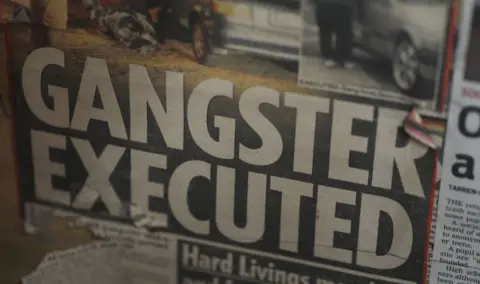
“The policing approach alone is unlikely to solve the problem because you might arrest people for being gang members, for having guns and for shootings and murders. They will go to prison, but then they get replaced by younger members. And that creates a whole different set of problems. They’re more likely to get into fights over territory and turf,” says Mr Newham.
“How does a kid get shot seven times in his head or three times in his back? How does a stray bullet hit a kid?” asks Pastor Engel.
On his phone, he calls up community leaders and gang kingpins, constantly cajoling to try and head off the violence. When BBC Africa Eye visits him he is trying to broker a ceasefire between two warring gangs – and manages to reach the jailed leader of one of them.
“If I want something to happen then it still happens. Do you understand pastor?” the gang boss shouts down the line. “But I can tell you one thing. I’m a guy that likes to counter if I come under fire.”
Threats. Even from behind bars.
But Pastor Engel is relentless. He is highly visible in his community, whether in the home of a parishioner or before his large and loud congregation in the pulpit on a Sunday.
“I think that what makes it very, very terrible now is there are more children involved in the gangs, because gangs are recruiting between the ages of eight and 15 years old,” he says.
The programme he runs used to get government money, but that has dried up. To cut off the supply lines and protect the innocent, he will meet victims and perpetrators anywhere and at any time.
He also sends rehabilitated gang members to negotiate directly with warring factions. Those who lived a life on the edge of death know how critical it is to push for peace instead.
Glenn Hans is one such person. He is meeting rival gangs to convince them to honour a ceasefire. “I was also in this game. As long as you make a decision that you want to be a better person. That’s all,” he tells a group of gang members.
One has a chilling response: “The more we kill, the more ground we seize and the more ground we have, the more we can build. So, for me to speak about peace – I cannot make that decision because it’s not my decision to ensure peace.”
The ceasefire that is eventually agreed lasts just a few days, shattered by the killing of two people in a drive-by shooting.
But some in the thick of the conflict have had enough.
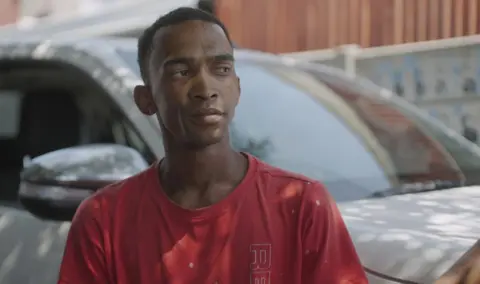
Fernando – or Nando – Johnston is in a gang called the Mongrels, and he wants to try and find a way out with the help of Pastor Engel.
The pastor describes Mr Johnston as being young and “born into the gang” since his whole family was involved.
“In this game there are only two options – it is either you go to jail or you die, ” says Mr Johnston.
“I really do want to change direction and I believe there is always a way. That is the reason I approached the pastor – to ask him if there is a plan or way to take me.”
He will join a six- to 12-week programme of rehabilitation run by the pastor and funded by charitable donations designed to get people off drugs and into work.
“The thing is you can now start building yourself up again,” Pastor Engel tells him. “You’ll be able to get yourself a job and make money for yourself. Then you won’t have to hustle and scavenge around here any more.”
“I’m ready to go, pastor,” says Mr Johnston, poised to leave his battered and scarred community in search of a new path.
Those closest to him have gathered to wish him well. His mother, Angeline April, holds back the tears, desperate that, this time, her son will choose life. “Please just make the best of this opportunity, Nando,” she says.
“Yes mummy, I always make the best of a situation.”
But that has never been easy.
“Fernando’s dad was a gangster but my other children’s father was a gentleman,” says Mr Johnston’s mother.
“But because he was a gangster, the children also got involved in gangsterism despite me constantly warning them. It wasn’t easy raising four boys on my own, you know. I’m always encouraging him to make a change, because I love him very much.”
And so far so good for Mr Johnston. Two weeks on from starting the programme, he is still there.
“Nando is stabilising. He’s in a works programme. He’s busy seeing his family, seeing his kids. He did a house visit yesterday. We let him loose and he came back and tested clear with no drugs in his system,” says Pastor Engel.
Hope is a rare commodity here, but it does sometimes spring through the cracks in the streets that have seen so much trauma.
Not all streets, though. Very little hope is found at Devon Africa and Undean Koopman’s house, which sits in the middle of a battlefield.
The cycle of killings and retaliation that hit the areas being fought over on the very edges of this beautiful South African city is overwhelming for many of those just struggling to survive.
And those caught in the middle often have to make impossible choices.
“Community members, even if they are opposed to the gangs, are not necessarily pro-police for two reasons,” says Mr Newham.
“One is that they just don’t know the police will actually come if called. And if they do call the police, they have no idea if the police officers are corrupt. People don’t understand the scale of the challenge in South Africa.”
Sentiments reflected by the peacemakers on the frontlines in this war. “Nobody is going to come from anywhere to help or save us. Not from overseas. Not from our local government. No-one is going to come with a magic wand to cure the Cape Flats,” says Pastor Engel.
“As individuals we need to be so determined to build up resilience, create hope for our people and to grow. Because politics has clearly failed us.”
More from BBC Africa Eye:
 Getty Images/BBC
Getty Images/BBC

